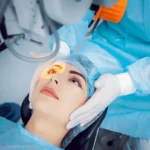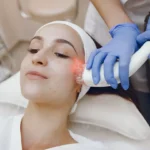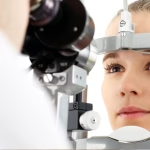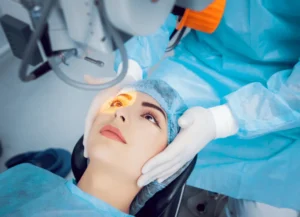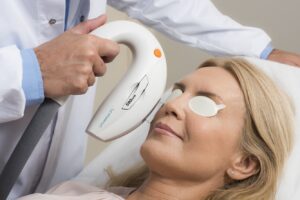Introduction:
Children explore the world primarily through their eyes. Clear vision is essential not only for learning but also for overall development and social interaction. Sadly, many issues related to vision in children can go unnoticed until they begin to interfere with day-to-day tasks. This is why scheduling regular pediatric eye exams is compulsory. These specialized eye cares are developed to detect vision problems at the early stage that offers the children the good chance for healthy visual development and academic success.
What Is a Pediatric Eye Exam?
A pediatric eye exam is an in-depth evaluation of a child’s vision and eye health, performed by a professional pediatric optometrist or ophthalmologist. Unlike standard vision screenings provided at schools, these exams include a complete analysis of visual acuity, eye coordination, depth perception, color vision and overall eye health. The exam is tailored to the child’s age, developmental level and communication ability, ensuring correct and stress-free evaluation.
Early detection of problems like myopia in children, strabismus, amblyopia and even signs of underlying health conditions like diabetes or neurological confusion can make a significant difference in treatment outcomes. A pediatric eye exam makes sure that no critical detail is overlooked.
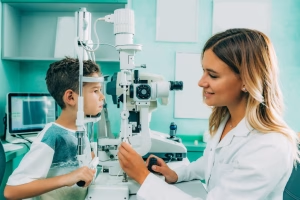
Why Are Eye Exams Important for Kids?
Most of the children may not realize they have a vision problem because they consider everyone sees the way they do. Unlike adults, children may not be able to articulate their problems or understand that their vision is not normal. This is why preventive eye exams for kids are essential.
Untreated vision problems can have long-term impacts such as:
- Behavioral and Attention Issues: Vision problems can sometimes mimic ADHD or other behavioral disorders leading to misdiagnosis.
- Delayed Learning and Reading Difficulties: Children rely heavily on visual input for learning. Poor vision can lead to trouble focusing on books or seeing the board in class.
- Lack of Confidence: Children who are trying to see may withdraw socially or lose confidence in their academic abilities.
- Increased Eye Strain and Fatigue: Straining to see clearly can lead to headaches, fatigue and discomfort, making learning and playing less enjoyable.
By scheduling a kids eye exam, you ensure your child has the tools needed for academic, social and emotional development.
Common Eye Issues Detected in Pediatric Eye Exams:
- Myopia: Increasingly common in school children, myopia makes distant objects appear blurry. It is often linked to excessive screen time and limited other activities.
- Hyperopia: This condition makes it difficult to look close objects clearly and may cause eyestrain during reading or writing.
- Astigmatism: A disorder and irregular shape of the cornea or lens causes blurred vision. It can affect both distance and near vision.
- Amblyopia (Lazy Eye): It is a condition where one eye develops better vision than the other. If not treated early, it can cause permanent vision loss in the weaker eye.
- Strabismus (Crossed Eyes): A misalignment of the eyes that can affect depth perception and lead to amblyopia if not treated.
These issues are not always observable to parents or teachers, making a pediatric eye exam that is essential for early diagnosis.
When Should Your Child Get an Eye Exam?
The American Optometric Association gives the following guidelines for pediatric eye exams:
- First Exam at 6 Months Old: To ensure proper eye alignment and rule out any inherited conditions.
- Second Exam at 3 Years Old: To assess visual acuity, eye coordination and developmental progress.
- Before Starting School (Ages 5-6): To ensure vision is enough for learning and classroom tasks.
- Every 1-2 Years Afterward: Or more frequently if your child wears glasses, has a family history of eye problems or shows symptoms of vision problems.
Regular exams ensure any developing condition is caught before it becomes serious.
Signs Your Child May Need an Eye Exam
Some children display behavioral signs that can signal vision issues. Look out for:
- Tilting the Head: Trying to adjust focus or eliminate double vision.
- Holding Books or Devices Close to the Face: May indicate problems seeing close or distant objects.
- Frequent Eye Rubbing or Blinking: Could be a sign of eyestrain, dryness or focusing problems.
- Poor Academic Performance: Struggling in school could stem from an inability to see the board or read clearly.
- Avoiding Reading or Near Tasks: A child might avoid close-up tasks due to blurry vision.
- Complaints of Headaches or Eye Pain: Often linked to uncorrected vision issues.
If you notice any of these symptoms, it is time to search for a pediatric exam near me and schedule an appointment.
How to Prepare for a Pediatric Eye Exam
By helping your child to feel comfortable about their exam can make the process smoother:
- Choose the Right Time: Select the time when your child is well-rested and alert.
- Discuss the Visit: Explain the purpose in simple, reassuring terms. Avoid using words like test or failing.
- List Observed Symptoms: Be ready to describe any changes in behavior or vision-related concerns.
- Bring Previous Medical Records: Specifically, if there are known vision issues or developmental delays.
- Ensure Glasses Are Worn: If your child already uses corrective lenses then bring them to the exam.
What Happens During the Exam?
A kids eye exam is basically adjusted based on the child’s age:
- Toddlers and Preschoolers: Simple tests using shapes, symbols or matching games assess visual acuity and eye coordination.
- Infants: The doctor checks for proper eye alignment, pupil response and object tracking.
- School-Age Children: More advanced charts and digital instruments measure focusing ability, eye teaming, depth perception and screen-related eye strain.
The optometrist may use eye drops to expand the pupils that allows a better view of the retina and optic nerve. The process is painless but may cause temporary light sensitivity.
If a problem is detected, the doctor may suggest corrective lenses, suggest vision therapy, or suggest further medical evaluation.
FAQs About Pediatric Eye Exams
- What age should my child have their first eye exam?
6 months old, according to the American Optometric Association. - How often should kids take eye exams?
Age 6 months, 3 years, before starting school, and every 1 to 2 years after that. - What is the difference between a vision screening and a pediatric eye exam?
Vision screenings are basic and often miss important issues. Pediatric eye exams are comprehensive and diagnostic. - What are signs of myopia in children?
Squinting, sitting close to screens or trying to look at distant objects clearly. - Can a pediatric eye exam detect learning disabilities?
While it cannot diagnose learning disabilities, it can rule out vision issues that may mimic them. - Are eye exams covered by insurance?
Yes, most of the insurance plans cover annual eye exams for children. - What happens if my child needs glasses?
The optometrist will help to select lenses and child-friendly frames suited for active lifestyles. - How long does a kids eye exam take?
Generally it takes 30 to 60 minutes, depending on the child’s age and needs. - Are dilating drops necessary?
Yes of course, in many cases. They help the doctor see the inner structures of the eye more clearly. - What if my child is afraid of the eye exam?
Select a pediatric optometrist who is experienced in making kids comfortable. You can also prepare your child by discussing what to expect.
Conclusion:
Regular pediatric eye exams are an essential part of your child’s healthcare plan. Early detection of conditions like myopia in children or amblyopia can improve your child’s quality of life and prevent problems. If you are searching for a “pediatric eye exam near me” then ensure you choose a professional pediatric optometrist who specializes in child-friendly care.
Do not wait until your child complains about their vision. Schedule an eye exam today and give your kids the gift of clear and healthy vision for life.

